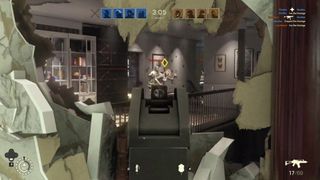Why Ubisoft must make Rainbow Six Siege moddable

We're only a day in, but Rainbow Six Siege may stand up as the most pleasant surprise of E3. We'd heard that Ubisoft was moving away from the direction we initially saw in the now-cancelled Rainbow Six: Patriots, but we weren't sure what to expect from its second crack at rebooting the franchise. What Ubisoft showed at its E3 press conference was absolutely encouraging, but here's the catch: if players can't build their own content in what is presumably a systems-driven, multiplayer-focused shooter (we do know that it'll have a campaign ), can we really expect Siege to have a long lifespan?
Ubisoft's gameplay video suggests that aspects of Siege are randomized, like the hostage location, number of enemies, and what weapons or tools they bring to the encounter. We can see enemies (AI or players, we're not entirely sure) barricading doors and windows. Remote-controlled gadgetry is used to find the hostage, which would be pointless if NPCs were holed up in the same location each time you loaded that level. There's a cooperative planning mode that precedes each mission, hinting at replay value. And there's seemingly fully-modeled penetration on basic firearms, with walls that rip apart under small arms fire. If I hadn't been sitting at an Ubisoft conference, I would've sworn I was watching the second coming of SWAT 4.
I'll get a better sense of how these systems hold up when I see Rainbow Six Siege later this week, but even if this randomization is well-designed and facilitates a ton of variance, there's only so far it can go. Ultimately, you'll still be storming the same location and probably a very similar scenario. Left 4 Dead 2 players can speak to the wonderful spontaneity that takes place when you load up a custom campaign for the first time—it's a pure experience that FPS players cherish, one of not knowing what's around the next corner and having to manage threats as you learn an environment. That's an experience that Ubisoft can duplicate in Siege, but not by cranking out individual DLC mission packs, if that ends up being its post-launch plan for the game.

Only by opening the Rainbow Six up to modders can Ubisoft expect Siege to live beyond the six or eight months of attention that most conventional FPSes earn these days. Ubisoft should look to Left 4 Dead 2's longevity as an example. The half-decade lifespan of what was essentially a quick sequel from Valve is entirely owed to the thousand-some campaigns and countless other content that players published to Steam Workshop and other community sites. When Crash Course, Dead Stream, or a re-released No Mercy got boring, there was a ridiculous Crash Bandicoot campaign waiting. Or an insane re-creation of Silent Hill 2 in Source. Even Valve's official post-release content, like The Sacrifice, paled in scope, detail, novelty, and difficulty to the excellent levels that the community put out for free.
Siege seems like the PC's first chance in years for a proper, systems-driven Rainbow Six game. Ubisoft doesn't have a great history of making its franchises moddable, but Siege is the instance where they'd benefit most from opening up creation of future content to the public. The last thing we (and hopefully Ubisoft) would want is for Siege to end up like the dozens of other FPSes that hold our attention for three or four months before being put down forever. If they aren't willing to make it moddable, at the very least a level editor that'd allow players to construct their own scenarios by placing enemies, objects, and hazards would be an incremental step toward prolonging the life of the new Rainbow Six.
The biggest gaming news, reviews and hardware deals
Keep up to date with the most important stories and the best deals, as picked by the PC Gamer team.

Evan's a hardcore FPS enthusiast who joined PC Gamer in 2008. After an era spent publishing reviews, news, and cover features, he now oversees editorial operations for PC Gamer worldwide, including setting policy, training, and editing stories written by the wider team. His most-played FPSes are CS:GO, Team Fortress 2, Team Fortress Classic, Rainbow Six Siege, and Arma 2. His first multiplayer FPS was Quake 2, played on serial LAN in his uncle's basement, the ideal conditions for instilling a lifelong fondness for fragging. Evan also leads production of the PC Gaming Show, the annual E3 showcase event dedicated to PC gaming.
Most Popular






